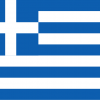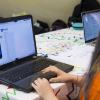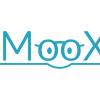Open Academic Courses from Greek Universities
The Open Academic Courses (AAM) programme is a Greek national initiative aiming at free and free access to academic knowledge via the internet, contributing to the extroversion of Higher Education Institutions (HEIs), equal access to knowledge and lifelong learning.
It started with the National and Kapodistrian University of Athens (NKUA), the largest and oldest university in Greece and the Eastern Mediterranean, as its main shareholder, developing more than 3,500 open academic courses.
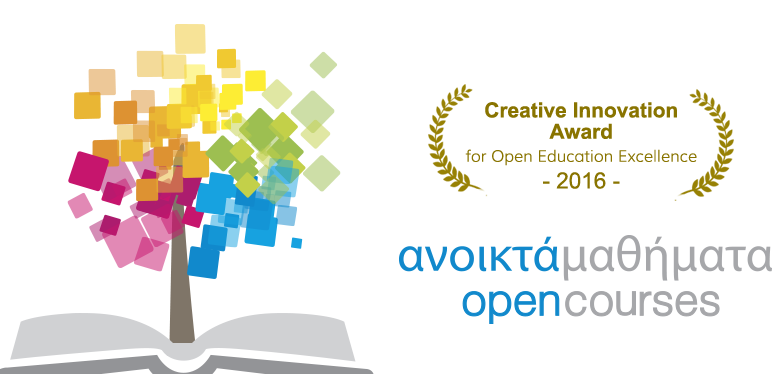
History and Evolution
The development of Digital Courses in Greece started already in 2003, with the support of the Ministry of Education and the strategic contribution of GUnet, which made the Open eClass platform available. In 2010, following an evaluation, the need to upgrade the quality of digital courses and create a national search portal was identified. The result of this need was the implementation of the programme Open Academic Courses (central development) and a Central Register of Greek Open Courses (horizontal development), funded by the NSRF Programme 2007–2013 and 2014–2020.
Objectives and Philosophy
The main objective of the programme was to open up academic courses to society, with an emphasis on quality, accessibility and intellectual property rights. AAMs were designed as courses taught in Greek universities, freely accessible and freely available on the Internet for all (including under open Creative Commons licenses).
The sub-objectives included:
- Strengthening the culture of open education in HEIs in the long term (information, awareness raising and staff training actions, etc.).
- Saving resources through shared infrastructure: common central AAM search portal, common AAM hosting platforms and multimedia video-type content (Open eClass, Open Delos), equipment for centralised AAM and content hosting.
- Creating educational content that is accessible and useful to a wide audience, not only to students, but also to higher education graduates, students, professionals and in general to anyone who wishes to acquire new knowledge.
- Support creators (teaching staff) through technical teams and support staff.
Classification of Courses and Specifications
For quality assurance, AAMs were categorised into three categories:
- Category A-: Description, notes, bibliography, keywords,
- Category A: All of the above plus synchronized audio (podcast format),
- Category A+: All the above and additional video lectures, self-assessment exercises, multimedia tools.
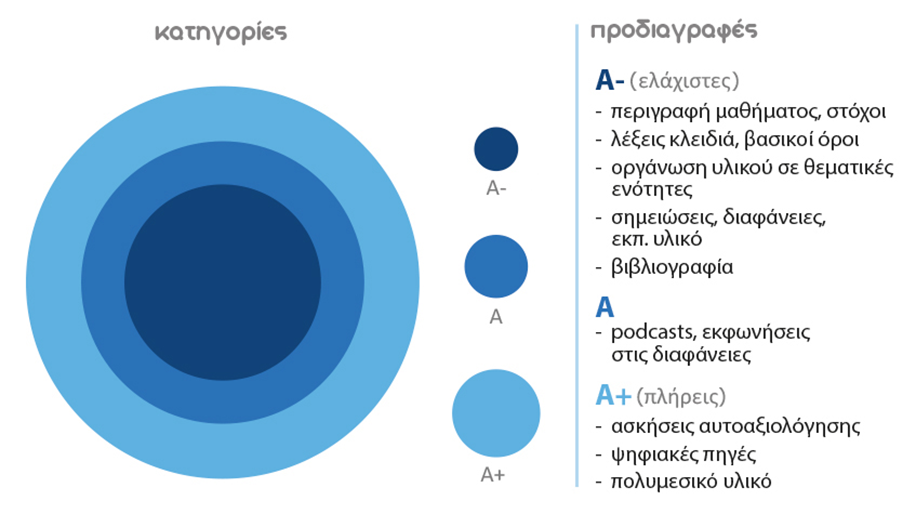
These categories allow for gradual integration of teachers (and users) into the logic of open teaching, enhancing participation without presupposing a high technological level from the outset.
Why is it good practice?
- Over 3 500 high-quality AAMs from 25 Greek universities.
- More than 1,100 Type A+ courses and more than 80 Type A courses (with sound).
- AAMs account for 7.7% of all courses delivered in Greek universities (45,000).
- More than 3,600 faculty members participated with their own courses.
- More than 500 technical and scientific staff supported the development of AAMs.
- Over 20,000 educational videos.
- Three (3) National Infrastructures: Open eClass, Open Delos, National Portal opencourses.gr.
- More than 400,000 unique visits per month to institutional AAM platforms.
- 4 Open Courses (opencourses.gunet.gr) with concise and detailed instructions exclusively for teaching staff and AAM development support staff, such as Intellectual Property Rights, development of educational material for people with disabilities and AAM development issues.
- The programme was awarded the 2016Open Education Award for Excellence in the Creative and Innovative Projects category.
The contribution of the above initiative to the promotion and provision of STEM-related courses (Science, Technology, Engineering, Math) is of the utmost importance, exceeding a total of 1,500, i.e. more than half of all AAMs.
In more detail, the AAM numbers per STEM sector (approximately):
- Science: 470 (of these, 384 relate exclusively to AAMs for Computer Sciences, Informatics, Telecommunications),
- Technology: 270
- Engineering: 620 (of these, 203 relate exclusively to AAMs for Computer and Electronic Engineering Sciences),
- Mathematics: 170
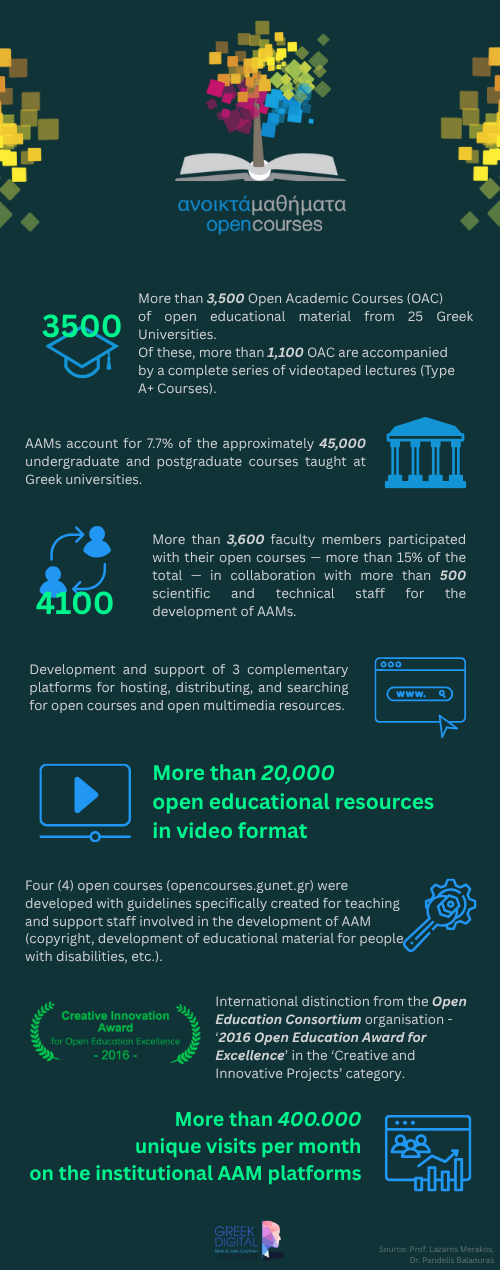
It is worth noting that the Academic Internet GUnet conducted in 2010 an evaluation survey on the Open Academic Courses initiative which included 1,005 responses from creators and users (students, students, citizens).
Evaluation by Users
- 71.34% of the public comes from the general public.
- 63.48% are women.
- Age: 38.61% are over 45 years of age.
- 35.62% do not have a higher education degree.
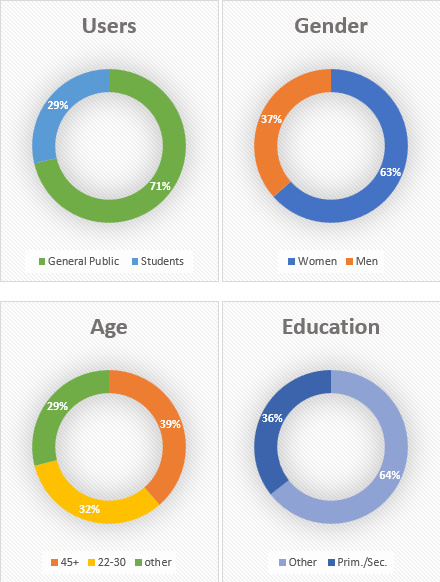
Satisfaction levels:
- 96.6% positive assessment of platform usability.
- 96.6% positive feedback on the quality of the material.
- 95.3% of users find the courses useful for professional/personal development.
- 98.2% want more AAMs.
- 81.5% are interested in knowledge certification.
The evaluation showed widespread social acceptance of AAMs by users, especially those with limited access to traditional education.
Evaluation by Teachers
Of the 57 AAM teachers/creators who replied to the questionnaire:
- 100% gave a positive assessment of the quality and integrity of digital and multimedia material.
- 96.5% said they were satisfied with the experience of AAM development.
- 98.25% would recommend joining colleagues.
- 94.7% believe that AAMs help with attendance.
In addition, it seemed that the technological and pedagogical support offered to teachers through the support structures was recognized.
Benefits for HEIs
AAMs have had multiple positive effects on Greek higher education institutions:
- Extroversion: Opening of HEIs to society and international presence.
- Social policy: Support students with disabilities, financial or geographical barriers.
- Teaching practice: Enhancing teachers' digital skills, strengthening the concept of Open Education in the Greek academic community.
- Infrastructure: Development of new hosting services and systems.
- Policies: Formation of public policies of open education in public Greek state institutions.
Challenges and Lessons
- The need for constant information and training of teaching staff.
- Demanding design for accessibility, rights and multimedia.
- Need to certify knowledge in a massive and sustainable way.
- Balancing development costs with quality on offer.
The experience of HEIs has shown that success depends on providing support to creators and having a strategy, not just funding.
Conclusions and proposals for the future
The long-term implementation of the programme has shown:
- The maturity of the Greek academic system in terms of the production of open educational content.
- The important social impact of the project.
- The need for continuity, both with a new cycle of projects and with the institutional consolidation of open education.
Proposals for the future:
- Institutionalisation of open education.
- Re-engage digital platforms with information campaigns.
- Development of courses with the possibility of certification.
- Creation of collaborative communities of practice among HEIs.
The AAM Programme is not only an infrastructure and content project, but a digital heritagefor higher education and society at large.

